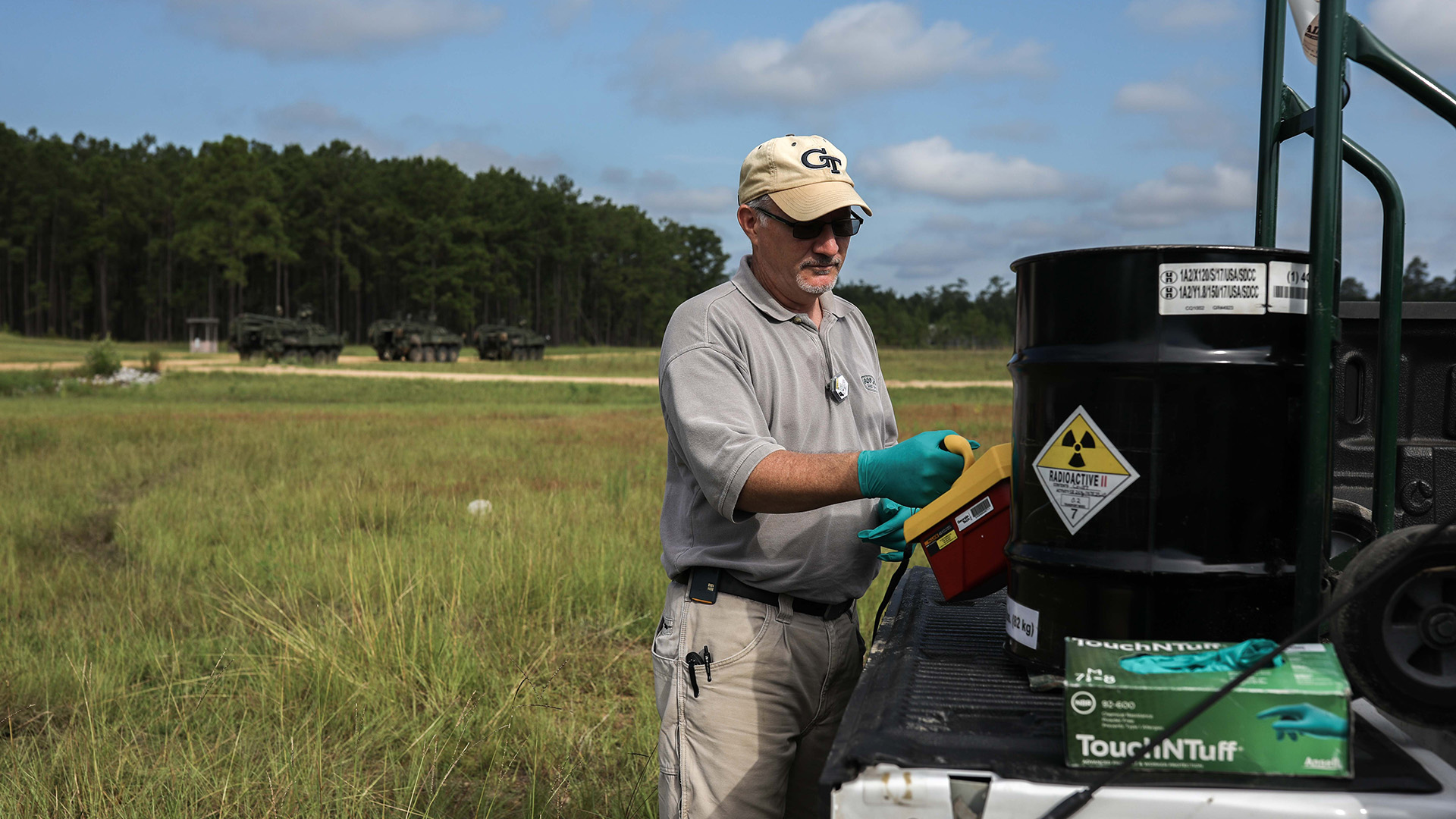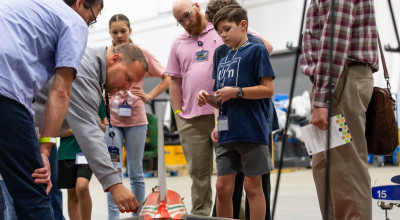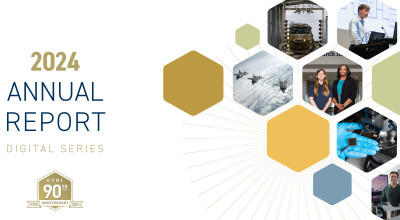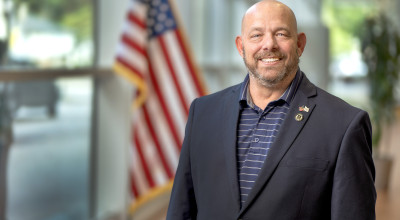Gregory Louden, Principal Research Engineer in the Georgia Tech Research Institute's Advanced Concepts Laboratory (ACL), and head of its Advanced Warfighting Technologies Division, was recently honored with the Ivan Allen College Distinguished Georgia Tech Alumni Association Award.
Inaugurated in 2015, the Distinguished Alumni Awards celebrate excellence in the College community. Annually, the Alumni Association presents three categories of awards: the Distinguished Alumni Awards, recognizing graduates from each of the Institute's six academic Schools and from each of Georgia Tech's ROTC branches of service; the Ivan Allen Jr. Legacy Awards, honoring a faculty member and graduate and undergraduate students; and the Dean’s Appreciation Award, honoring steadfast friends and supporters of the College.
In honoring Gregory Louden with the Distinguished Alumni Award, Georgia Tech celebrates not only his individual accomplishments, but also his embodiment of the Institute's ethos: “Progress and Service.”
Gregory Louden makes acceptance remarks during the 10th Annual Ivan Allen College 10th Annual Distinguished Alumni Awards.
From Georgia Tech to Global Impact
Greg’s journey is a compelling narrative of how a solid foundation in mechanical engineering-- obtained from Georgia Tech--can be the bedrock for a career that spans the most critical aspects of national security and technology. After he earned his bachelor’s degree in Mechanical Engineering (BME) in 1988, Greg’s career trajectory has exemplified the Institute's dedication to producing leaders capable of tackling the toughest technical challenges.
Leading the Charge in Advanced Warfighting Technologies
Greg was commissioned into the U.S. Army Corps of Engineers with the rank of Second Lieutenant through the Georgia Tech ROTC program. After serving as a sapper in an armored cavalry regiment and a light infantry brigade, he completed his military career as an Army nuclear and counterproliferation officer. After retirement, Louden provided contract support to U.S. Department of Defense and National Nuclear Security Administration programs. He also supported a Defense Threat Reduction Agency global nuclear security program effort developing computer-based nuclear security training for the International Atomic Energy Agency.
Since March 2017, Greg has led the Advanced Warfighting Technologies Division (AWTD) at the Advanced Concepts Laboratory within GTRI. His work, focusing on counterproliferation technologies, special operations enablers, and advanced ground maneuver concepts, has not only advanced the field but also ensured that GTRI remains a crucial contributor to national security. AWTD's efforts under his leadership in technology development, tactical analysis, threat assessment, and rapid technology prototyping underscore the critical role of research institutes in enhancing warfighting capabilities.

Greg Louden shares smiles during the Distinguished Alumni Awards gala with (l.-r.) 1) his mother, Joan Louden-Black; his wife, Meredith; and his daughter Audrey. 2) Dean of the Ivan Allen College of Liberal Arts Kaye Husbands Fealing. and 3) fellow Distinguished Alumni Award recipient Maj. David Van Pham. (photo credit: Christopher J. Moore)
A Career Dedicated to National Security
Before his tenure at GTRI, Greg's roles spanned across various organizations critical to national defense. From his time at Parsons Corporation, where he oversaw the development and delivery of nuclear security training for International Atomic Energy Agency member states, to his work with Pro2Serve managing national security programs, Greg’s efforts have significantly contributed to global nuclear security and the reduction of threats.
His experiences extended to being a Counterproliferation Officer at the Defense Intelligence Agency, where he led the Weapons of Mass Destruction Forensics Team, and served the Joint Staff as an Operations Officer. Each role has built upon his expertise in nuclear engineering, a testament to his educational background and commitment to safeguarding against global threats.
A Legacy of Leadership and Mentorship
Louden's receipt of the Distinguished Alumni Award is a recognition of his outstanding contributions to his field and his unwavering commitment to the values instilled in him by Georgia Tech. His leadership at GTRI and beyond serves as an inspiration to current students, alumni, and fellow researchers, demonstrating the profound impact one individual can have on national security, technological advancement, and the betterment of society.
Greg exemplifies the spirit of innovation and dedication that Georgia Tech champions, making him a deserving recipient of this distinguished honor.
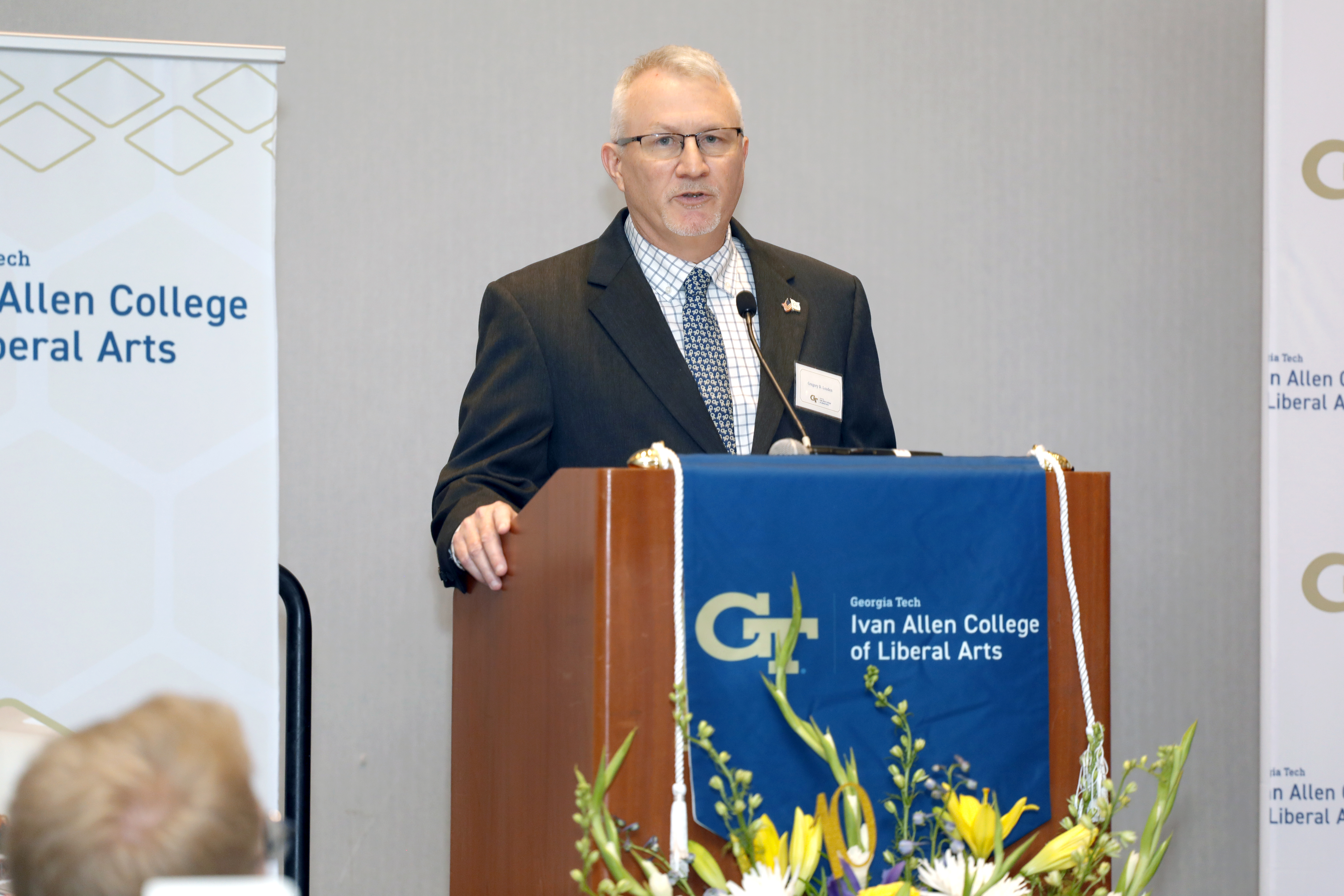
Greg Louden accepting award.
Q&A With Greg Louden
GTRI Communications Writer/Editor Christopher Weems spoke with Geg Louden about his career and the Distinguished Alumni Award. The excerpt follows:
Q: Congratulations on receiving the Georgia Tech "Distinguished Alumni Award." What does this recognition mean to you, personally and professionally?
Louden: I’m a firm believer that there is no ”I” in TEAM. This award reflects the hard work and sacrifices of the Soldiers and national security professionals that I’ve worked with over my career.
Q: Can you walk us through the journey that led you to your current position at the Georgia Tech Research Institute (GTRI)? Particularly, how did your academic experiences at Georgia Tech set you on your career path?
Louden: I graduated with a four-year commitment in the Army due to my ROTC scholarship, which ended up being a 22-year career. After military retirement I moved my family to Knoxville to continue supporting national security as a contractor. I was contacted in 2017 by my Army mentor that GTRI was looking for someone like me.
Q: Could you highlight one or two projects that you are particularly proud of and explain their impact?
Louden: AWTD does a lot of unmanned systems and counter-drone work that is impacting the current fight in Ukraine. We are currently also working with the Soldiers of the 3rd Infantry Division at Fort Stewart to develop a networked mold conditions sensor system for their barracks. This prototype system will mitigate a systemic problem that when the Soldiers return from multi-month deployments their personal belongings and furniture must be discarded because of mold.
Q: How do you believe your work at GTRI and your academic background from Georgia Tech have contributed to advancements in your field?
Louden: The undergraduate grind at Georgia Tech more than prepared me for every challenge that I faced within my career. Earning my master’s degree from the Air Force Institute of Technology was a breeze compared to GT.
Q: Collaboration between academia and industry is crucial in technology and research. From your experience, how does GTRI foster this collaboration, and what role do alumni play in it?
Louden: We have a robust collaborative relationship with the Resident Instruction side of GT. GTRI is able to take advantage of their cutting-edge technologies and apply them to national security problems.
Q: Looking towards the future, what are your professional goals, and how do you plan to continue contributing to your field and to Georgia Tech's legacy?
Louden: I’m winding down my career and looking forward to transitioning to retirement. I was very fortunate to have been teamed with Mike Shannon. Mike set the vision for AWTD and I focused on the execution of that vision. Our legacy will be a GTRI division focused on developing capabilities for the ground maneuver warfighter.
Q: Is there any advice you would give to current Georgia Tech students and young researchers who aspire to make a significant impact in their fields?
Louden: Seek opportunities to broaden your experience. One of the strengths that I often draw upon is the set of skills that I developed in the military, industry, and at GTRI.
More information about the Distinguished Alumni Awards can be found here.
Writer: Christopher Weems (christopher.weems@gtri.gatech.edu)
GTRI Communications
Georgia Tech Research Institute
Atlanta, Georgia USA
The Georgia Tech Research Institute (GTRI) is the nonprofit, applied research division of the Georgia Institute of Technology (Georgia Tech). Founded in 1934 as the Engineering Experiment Station, GTRI has grown to more than 2,900 employees, supporting eight laboratories in over 20 locations around the country and performing more than $940 million of problem-solving research annually for government and industry. GTRI's renowned researchers combine science, engineering, economics, policy, and technical expertise to solve complex problems for the U.S. federal government, state, and industry.

